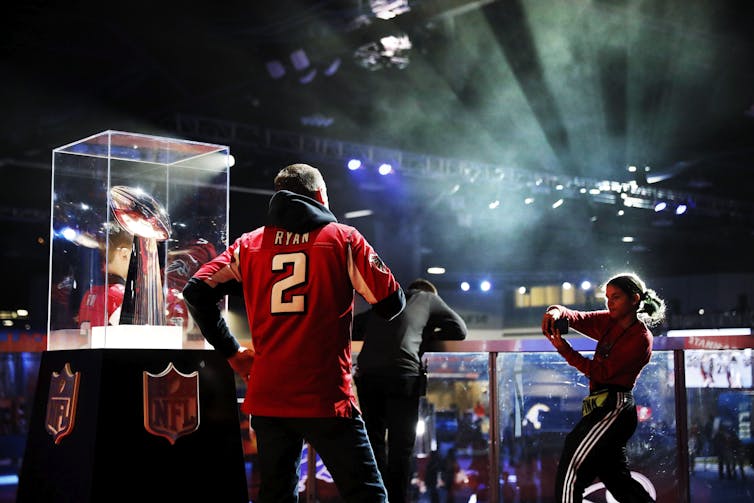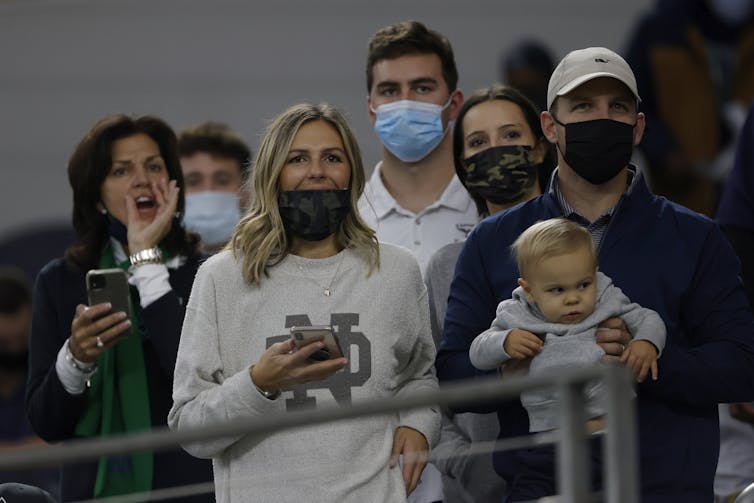Tens of millions of fans will tune into the 55th Super Bowl on Feb. 7 to watch the Tampa Bay Buccaneers play the Kansas City Chiefs. Despite the ongoing pandemic, 22,000 of those fans will be screaming and cheering from the stands in Tampa, Fla.

The number of new cases of COVID-19 in Florida peaked in early January, and have been in decline since. Still, the state is reporting about 46 cases and 0.79 deaths per 100,000 residents in the last seven days. A more infectious strain of COVID-19, known as B.1.1.7, is on the rise in the state.
In all, 27,018 people have died from the coronavirus in Florida. Only Texas, California and New York have seen a greater number of deaths.
Our ongoing research, centred on the ethical dilemmas faced by fans, athletes and organizations around the return to live sports during an ongoing pandemic, gives insight into the constructs that influence individuals when making ethical decisions. Public health officials and politicians have access to the same data on COVID-19 cases, deaths and transmission, so why do they arrive at different decisions?

A pandemic Super Bowl
The rules governing fan participation at major sporting events have varied during the pandemic. Lately, the decision has been left to local health authorities. Some states allow fans but others don’t. When California banned attendance at sporting events, the Rose Bowl was moved to Arlington, Texas.
The 55th Super Bowl will be a scaled-down version of past events. The National Football League has given tickets to 7,500 vaccinated health-care workers, and the rest will go to fans and the media, many of them travelling to Florida from all over the U.S. They will have to wear face masks, but none of them will need to show they have been vaccinated or be tested before entering the stadium.
We recognize that society is currently operating in a grey zone, where the social conventions and rules of behaviour during COVID-19 are still being established. Often, once codes of conduct are established, laws soon follow. Yet, in the interim, sports fans are largely left to decide for themselves on whether going to a game is safe.

(AP Photo/David Goldman)
So, why would Florida Gov. Ron DeSantis allow 22,000 fans to attend the game? As a mega sport event, the Super Bowl is more than just the game, it is a week-long event with live music, sponsor parties, events with NFL legends and the opportunity to take your picture with the Vince Lombardi Trophy.

Why allow fans?

Get daily National news
Research from the early stage of the pandemic suggests there is a partisan divide when it comes to enforcing and following physical distancing orders. Republicans are less likely to impose and follow social distancing orders in support of personal freedoms.
DeSantis, a Republican governor, has said he won’t shut down Florida to stop the spread of the coronavirus, that people should have freedom and practise personal responsibility, and that it’s not the government’s responsibility to impose social distancing orders. Florida has also bid to host the postponed 2020 Olympic Games should Japan decide to cancel them.
There’s also the health-care perspective. The discourse around “flattening the curve” has widely been based on the number of beds available in hospitals.
- Trump doubles down after U.S. Supreme Court strikes down global tariffs
- Real Canadian Superstore fined for ‘misleading’ Product of Canada displays
- ‘No reason to continue discussing’: Ontario mayor wants Andrew’s name dropped
- Danielle Smith promises Alberta referendum over immigration, Constitution changes
As COVID-19 cases surged this past summer in Florida and ICU beds filled up, DeSantis continued to defend the state’s hospital capacity. In early February, hospital beds in the Tampa Bay area were at 84 per cent capacity.
Even if a region’s hospitals have space for patients, is it ethical to knowingly put more people at risk? Jacinda Ardern, the prime minister of New Zealand, implemented an aggressive strategy to eliminate COVID-19 because her government realized that the health system didn’t have the capacity for a large outbreak. Only 25 people have died in New Zealand from COVID-19.
The sporting event industry has been hit hard by COVID-19. The NFL has projected US$3 billion to US$4 billion in lost revenues. Local economies can benefit greatly from hosting large events like the Super Bowl.
Florida and Tampa may be especially eager to have fans attend since the Buccaneers are the first team in 50 years to play a Super Bowl at home. Past research suggests that the hometown fan advantage can enhance performance.
But is it safe?
Before attending a sporting event, the Centers for Disease Control and Prevention (CDC) recommends fans know the number of COVID-19 cases where they live and where the event is taking place. They should also pay attention to the “transmission rate (Rt),” the average number of cases caused by one infected individual. The higher the value, the faster the spread, but when the value is less than one, the spread of the disease is slowing down.
As of late January, the transition rate for Florida was 0.97, which means that each person infected with the disease would spread it to just under one other person. For comparison, Ontario’s Rt value is 0.84.
The Tampa Bay Buccaneers averaged 14,483 fans per game this season, the third-highest in the NFL. For the Super Bowl, they will have to deal with a 50 per cent increase in attendance. And fans appear eager to attend: ticket prices for the available seats are skyrocketing.

(AP Photo/Ron Jenkins)
The CDC states that what matters most for COVID-19 transmission is how the stadium seating is set up. Groups from different households should remain at least two metres apart from each other.
Assuming everyone arrives as a two-person household, each group would require six seats, or 66,000 seats total, exactly the capacity of the Tampa stadium. Fans, however, will be on the move, both upon entry, exit and at various times throughout the game. People must wear masks at Super Bowl events or risk being fined up to US$500.
Still, recent polls show that only 40 per cent of U.S. adults would attend an outdoor sporting event even after getting vaccinated. For many, attending a sporting event remains too risky.
Businesses, government officials and public health experts may have access to the same information but many have reached different conclusions. Ticket prices aside, given the chance to attend this year’s Super Bowl, would you do it?
Kathleen Rodenburg, Assistant Professor, Gordon S. Lang School of Business and Economics, University of Guelph; Ann Pegoraro, Lang Chair in Sport Management, Lang School of Business and Economics, University of Guelph, and Lianne Foti, Assistant Professor, Gordon S. Lang School of Business and Economics, University of Guelph
This article is republished from The Conversation under a Creative Commons license. Read the original article.








Comments
Want to discuss? Please read our Commenting Policy first.